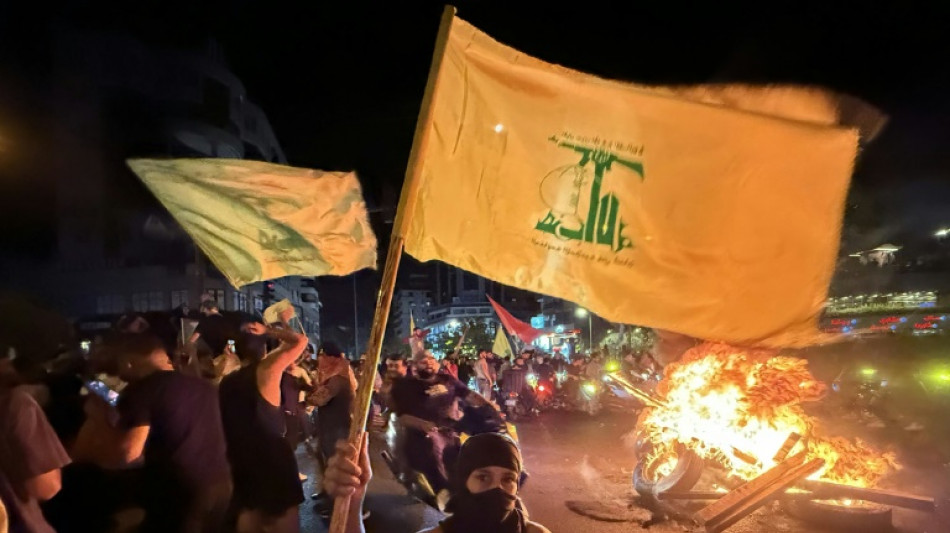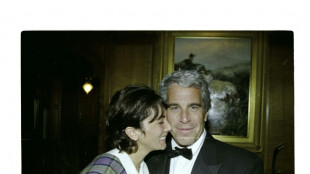

Lebanon cabinet meets again on Hezbollah disarmament
Lebanon's cabinet met on Thursday for the second time in days to discuss disarming Hezbollah, after the Iran-backed group rejected the government's decision to take away its weapons.
The meeting considered a US proposal that includes a timetable for Hezbollah's disarmament, with Washington pressing Beirut to take action.
Information Minister Paul Morcos said the cabinet endorsed the introduction of the US text without discussing specific timelines. The government said on Tuesday that disarmament should happen by the end of this year.
The introduction endorsed in Thursday's meeting lists 11 "objectives" including "ensuring the sustainability" of a November ceasefire with Israel, and "the gradual end of the armed presence of all non-governmental entities, including Hezbollah, in all Lebanese territory".
It also calls for the the deployment of Lebanese troops in border areas and the withdrawal of Israeli troops from the five places in the south they have occupied since last year's war with Hezbollah.
The November ceasefire that sought to end more than a year of hostilities between Israel and Hezbollah stipulated that weapons in Lebanon be restricted to six military and security agencies.
Following the cabinet decision on Tuesday, Morcos said the Lebanese government was waiting to review an "executive plan" on Hezbollah's disarmament.
The army was tasked with presenting a plan to restrict the possession of weapons to government forces by the end of August.
Only then would the government review the full provisions of the US proposal, whose implementation "is dependent on the approval of each of the concerned countries", the information minister said.
- US support -
Four Shiite Muslim ministers, including three directly affiliated with Hezbollah or its ally the Amal movement, walked out of Thursday's meeting in protest at the government's disarmament push, Hezbollah's Al Manar television reported.
They also refused to discuss the proposal submitted by US envoy Tom Barrack, the report said.
In a post on X, Barrack hailed Lebanon's "historic, bold, and correct decision this week to begin fully implementing" the November ceasefire.
France's foreign minister Jean-Noel Barrot in a message on X hailed Lebanon's disarmament initiative as "a brave and historic decision" that would enable the country to rebuild and "protect all its communities".
Under Lebanon's sect-based power-sharing system, the absence of the Shiite ministers from this week's cabinet meetings could support the claim that the decisions taken lacked consensual legitimacy, however.
Before last year's war with Israel, Hezbollah had wielded sufficient political power to impose its will or disrupt government business.
But the Shiite group has emerged from the war weakened, reducing its political influence.
- 'Correct the situation' -
Hezbollah's parliamentary bloc called on the government on Thursday to "correct the situation it has put itself and Lebanon in by slipping into accepting American demands that inevitably serve the interests of the Zionist enemy".
The group said on Wednesday that it would treat the government's decision to disarm it "as if it did not exist", accusing the cabinet of committing a "grave sin".
Late Thursday, hundreds of Hezbollah supporters took to the streets of Beirut's southern suburbs to protest the government decision, AFP photographers reported.
Lebanese media shared footage of similar rallies in other areas of the country where Hezbollah holds sway, while troops deployed to maintain order.
Israel -- which routinely carries out air strikes in Lebanon despite the November ceasefire -- has already signalled it could launch military operations if Beirut failed to disarm the group.
The Lebanese health ministry said Israel carried out several strikes on eastern Lebanon on Thursday, killing at least seven people.
Andrea Tenenti, spokesperson for UN peacekeepers in Lebanon, said on Thursday that troops had "discovered a vast network of fortified tunnels" in the south.
UN spokesman Farhan Haq told reporters that peacekeepers and Lebanese troops found "three bunkers, artillery, rocket launchers, hundreds of explosive shells and rockets, anti-tank mines and about 250 ready-to-use improvised explosive devices".
Prime Minister Nawaf Salam said in June that the Lebanese army had dismantled more than 500 Hezbollah military positions and weapons depots in the south.
S.Lambert--JdB



